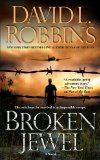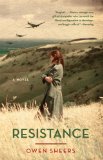Summary | Excerpt | Reviews | Beyond the book | Read-Alikes | Genres & Themes | Author Bio

A Novel
by A.L. KennedyIn A. L. Kennedy's intense novel,
Day, we meet Alfred Day, a man growing a
mustache and trying to understand the panic, terror,
disease and pain of war. World War II has ended, and
the boys have come home, but some, like Alfie Day,
have residual hurt, horrible dreams and regret.
Alfie joined the Royal Air Force when he was 16 so
that he could have adventure and get away from his
father. He was captured after a failed bombing
mission and imprisoned in Germany. After the war, he
wanders home and gets a job in a bookshop because he
loves to read. When an opportunity comes along to be
an extra in a movie about a prison camp, Day takes
the chance. His small job at the bookshop with Ivor,
another walking casualty, can wait until he finds
himself again, if that self still exists.
The film set is crowded and disorienting, and there
is not much for Alfie to do. With its maze of huts,
platoons of prisoners, and fake German officers, it
is eerily similar to Alfie's real life experience as
a prisoner of war. Every event on set prompts a
memory: playing ball with Pluckrose and the boys,
dropping bombs as a gunner, walking through the snow
with Ringer, and meeting Joyce. As each memory rolls
over him, he begins to realize the senselessness of
some and the pain of others. Older memories from
before the war of hurt and pain as a child, plus
observations of fights on the film set, only further
prove that Alfie's war did not start or end with
Germany.
Yet, through these black moments, there is joy in
the form of Joyce, the love of Alfie's life. His
memories of her, along with touching moments of
camaraderie between Alfie and the other RAF boys,
provide a few bright moments in a narrative that is
otherwise replete with death, pain, and regret.
Alfie struggles with his role in the war, and the
close relationships he remembers remind the reader
that he is sensitive and human. Alfie is not an easy
protagonist to love, he's too hard edged and dirty
mouthed for that, but he is sympathetic, and
Kennedy's illustration of his evolution will prompt
understanding from the reader.
Day is emotionally charged and raw. The
writing is sharp, acidic, and real. Just as Alfred's
mind lights from thought to thought, image to image,
so does the prose. In one paragraph, we are in the
camp, watching a concert, and in the next, we are
listening to a conversation between Alfie and
Pluckrose. The point of view changes from first
person to second person to third, as Kennedy takes
us in and around Alfie's thoughts. Many critics
agree that the impact for the reader is jarring, yet
we are made to feel as Alfie does: out of touch,
boundless, grasping for straws. But Kennedy never
leaves us too long in confusion; she tells us about
an event and then loops back later to explain, so
that we discover the significance and import as
Alfie does.
This disorienting prose style is the true strength
of Day; in fact, it's the key that makes the
entire story work. Without the constant shift of
perspective and non-linear story line, we would
never stand in Alfie's shoes, and that's the whole
point. We must follow Alfie, be Alfie to the end,
because learning what Alfie learns is the ultimate
lesson of life, a lesson that may ultimately save us
from war.
About the Author
Alison Louise Kennedy was born
in 1965 in Dundee, Scotland.
After studying English and Drama
at Warwick University, she
served as Writer in Residence at
Hamilton, East Kilbride Social
Work Department, and Copenhagen
University. She has edited
various magazines in the United
Kingdom, and has been a judge
for the Mann Booker Prize (1996)
and The Guardian First
Book Award (2001). She was made
a fellow of the Royal Society of
Arts in 2000. Granta nominated
her as one of 20 "Best Young
Novelists" in 2003. She is the
recipient of the Encore Award
(1995). In addition to her
writing career, she is also a
stand-up comedian and an
ordained minister, and has even
been known to sell brushes door
to door and mime in car parks.
Her work is known for its dark
comedy and unique, post-modern
prose style. She lives and
writes in Glasgow, Scotland.
For more about A.L. Kennedy
(who, incidentally, hates it
when reviewers talk about the
writer when they should be
talking about the book!) see the
comprehensive FAQ at her
website, which includes her
answer to the much asked
question, "Why do you write
under your initials?". To which
she replies:
NOT because I wanted to
be androgynous
NOT because I wanted to signal
that I'm gay (I'm not)
NOT because I'm a feminist (I'm
a humanist)
NOT because I wanted to give
endless journalists the chance
to write acres of nonsense about
two letters.
I was worried that if I ever got
published people would come and
complain if they knew who I was,
so I wanted to hide. (I didn't
know how impossible anonymity is
these days) And, rather more
centrally, the authors I first
loved all had initials – J.R.R.
Tolkien, C.S.Lewis, E.E.
Nesbitt., E.E. Cummings (I know
he's not for kids, but I liked
him for his melodies) and I
actively didn't want to know who
they were, or have them get in
the way of my enjoying their
story and their voice – which
was much closer than they could
be, given that it was partly
inside me.
![]() This review was originally published in The BookBrowse Review in January 2008, and has been updated for the
March 2009 edition.
Click here to go to this issue.
This review was originally published in The BookBrowse Review in January 2008, and has been updated for the
March 2009 edition.
Click here to go to this issue.

If you liked Day, try these:

by David L. Robbins
Published 2010
New York Times bestselling author David L. Robbins presents a riveting novel of war, love, and survival, set against the backdrop of an improbable rescue, the Los Baños prison raid -- one of the most daring episodes of World War II.

by Owen Sheers
Published 2009
Imbued with immense imaginative breadth and confidence, Owen Sheers's debut novel unfolds with the pace and intensity of a thriller. A hymn to the glorious landscape of the Welsh border territories and a portrait of a community under siege.
Your guide toexceptional books
BookBrowse seeks out and recommends the best in contemporary fiction and nonfiction—books that not only engage and entertain but also deepen our understanding of ourselves and the world around us.